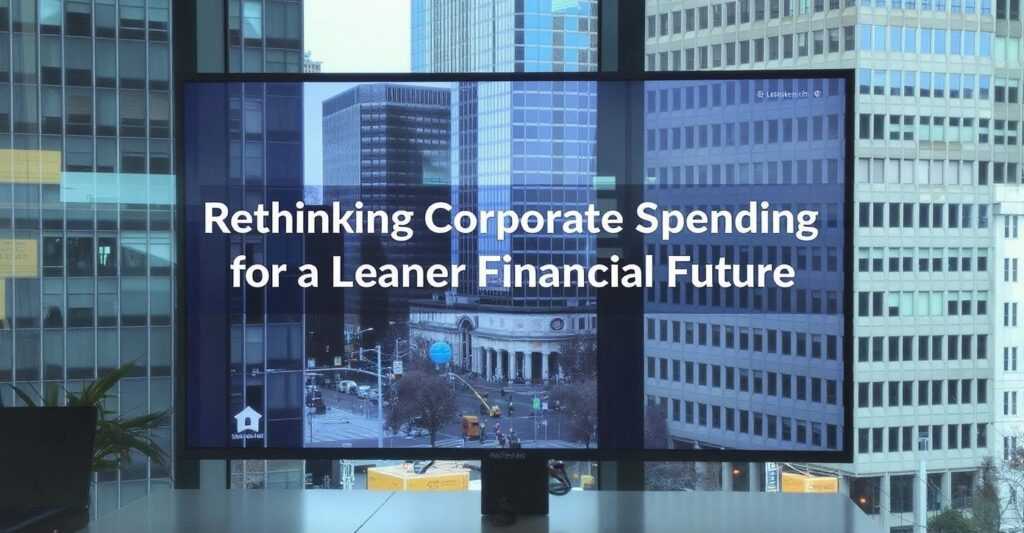In today’s volatile economic climate, businesses face increasing pressure to optimize costs, reduce waste, and align financial strategies with long-term sustainability. The shift towards a leaner Financial Future is not just a cost-cutting initiative—it’s a fundamental transformation in how companies operate and make strategic decisions. As organizations recalibrate their financial priorities, “Rethinking Corporate Spending for a Leaner Financial Future” emerges as a crucial theme for forward-thinking enterprises.
Global uncertainties, including inflationary trends, supply chain disruptions, and technological disruptions, are prompting companies to reassess spending across all departments. From procurement to operations, organizations must now focus on value-driven investments and responsible budgeting. This paradigm shift is about more than survival—it’s about building financial resilience and setting the stage for scalable, sustainable growth.
Strategic Financial Planning Takes Center Stage
Traditional budgeting models that rely on year-over-year incremental increases are no longer sufficient. To remain competitive, companies must embrace zero-based budgeting (ZBB) and dynamic forecasting models that encourage accountability and transparency. These models allow finance teams to allocate resources more effectively by requiring justifications for every line item.
By rethinking corporate spending for a leaner financial future, companies can better align their financial resources with strategic goals. This approach prioritizes investment in high-impact areas such as digital transformation, automation, employee training, and customer experience, while phasing out legacy costs that no longer serve the organization’s mission.
Tech-Driven Efficiency in Expense Management
Digital transformation plays a vital role in modern expense management. Advanced financial platforms powered by AI and machine learning help organizations analyze spend patterns, predict future costs, and detect anomalies in real-time. These tools streamline procurement processes, reduce manual errors, and increase compliance with corporate policies.
Organizations that prioritize tech adoption in finance functions gain better visibility into their expenses and identify opportunities for cost optimization. Automating invoice processing, adopting cloud-based ERPs, and integrating AI-based forecasting models are no longer optional—they are strategic necessities in the journey toward a leaner financial future.
Redefining Procurement and Vendor Relationships
Procurement, one of the most expense-heavy functions, is undergoing a strategic overhaul. Instead of focusing purely on cost reductions, companies are establishing value-based relationships with suppliers and seeking partners that offer reliability, innovation, and flexibility.
By rethinking corporate spending for a leaner financial future, procurement leaders are embracing supplier consolidation, category management, and sustainability-focused sourcing. These efforts not only reduce total cost of ownership (TCO) but also support broader ESG goals, aligning procurement strategies with the company’s long-term vision.
The Rise of a Lean Operations Culture
A leaner financial future is grounded in operational efficiency. Businesses are reengineering workflows to eliminate redundancies, reduce waste, and drive productivity. Adopting lean methodologies like Six Sigma, Kaizen, and Agile enables teams to identify bottlenecks and continuously improve processes.
Corporate leaders must foster a culture of lean thinking that permeates all levels of the organization. Employees should be empowered to question inefficient practices and suggest alternatives that enhance productivity and cost-effectiveness. Cross-functional collaboration is essential to achieving holistic operational excellence.
Reskilling Teams to Manage Smarter Spending
People are at the heart of every successful cost transformation. As organizations adopt new financial strategies and technologies, they must also invest in reskilling and upskilling their workforce. Finance teams need training in data analytics, automation tools, and modern forecasting techniques to manage resources effectively.
Moreover, employees across departments must be financially literate and aligned with the company’s budgeting priorities. Regular workshops, transparent communication, and goal-based incentives can help create a unified approach to corporate spending that supports long-term financial health.
Sustainability as a Spending Priority
Environmental, Social, and Governance (ESG) criteria are becoming key drivers of corporate financial decisions. Companies are rethinking spending to reduce their carbon footprint, embrace green technologies, and support community development initiatives. These sustainability efforts not only appeal to eco-conscious stakeholders but also deliver cost savings in the form of reduced energy consumption and regulatory compliance.
When rethinking corporate spending for a leaner financial future, ESG integration offers a dual advantage—mitigating risk and enhancing brand equity. Forward-thinking businesses are shifting from short-term cost cutting to long-term value creation through purpose-driven financial strategies.
Data-Driven Decision Making
Robust data analytics is essential in reshaping corporate financial practices. Companies leveraging real-time analytics tools can monitor spend performance, identify cost-saving opportunities, and benchmark against industry standards. Predictive models and scenario planning also enable proactive responses to changing market conditions.
Data-driven insights support smarter decisions on capital allocation, product development, and resource management. Leaders who make informed, analytics-backed decisions are better equipped to guide their organizations toward sustainable financial success.
Shifting from CapEx to OpEx Models
The preference for operational expenditure (OpEx) over capital expenditure (CapEx) is gaining momentum. Cloud computing, software-as-a-service (SaaS), and subscription-based models allow businesses to reduce upfront investments while increasing flexibility. These pay-as-you-go services offer scalability, reduce maintenance costs, and improve cash flow.
This OpEx model supports the leaner financial future many companies envision by enabling rapid innovation without the burden of heavy capital investments. As a result, more businesses are rethinking traditional asset ownership and adopting service-based consumption models that align with agile financial strategies.
Risk Mitigation and Compliance Management
Managing risk is a critical component of any financial strategy. In today’s regulatory landscape, businesses must ensure compliance with evolving standards while controlling costs. This includes automating compliance checks, conducting regular audits, and implementing internal controls that prevent financial mismanagement.
Rethinking corporate spending for a leaner financial future also involves mitigating risks associated with fraud, cybersecurity, and economic volatility. By investing in risk intelligence platforms and insurance solutions, companies can protect their assets while maintaining financial discipline.
Creating a Cost-Conscious Culture
Ultimately, achieving a leaner financial future requires a shift in mindset across the organization. From senior executives to front-line employees, everyone must embrace cost consciousness as a core value. Financial literacy programs, performance-based budgeting, and transparent reporting can reinforce accountability and drive responsible behavior.
A cost-conscious culture does not mean cutting corners—it means spending smartly, maximizing returns, and aligning every dollar spent with organizational objectives. By embedding this culture into daily operations, companies can create a sustainable foundation for growth, resilience, and innovation.
Read Full Article : https://bizinfopro.com/blogs/finance-blogs/rethinking-corporate-spending-for-a-leaner-financial-future/
About Us : BizInfoPro is a modern business publication designed to inform, inspire, and empower decision-makers, entrepreneurs, and forward-thinking professionals. With a focus on practical insights and in‑depth analysis, it explores the evolving landscape of global business—covering emerging markets, industry innovations, strategic growth opportunities, and actionable content that supports smarter decision‑making.



